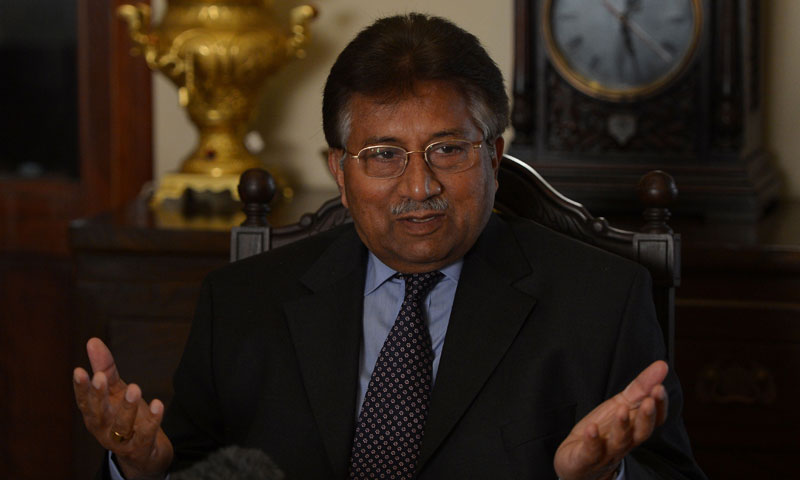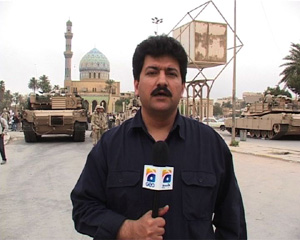Lately there has been much speculation as to whether Pakistan is fast heading towards another stint of military rule. In the backdrop of tension between the civilian leadership and the military establishment caused due to the developments related to the trial of General Pervez Musharraf and attack on reputed TV anchor Hamid Mir and other elements of discontent and discord. Some elements, erroneously suspect the involvement of military establishment in recent reactivation of Pakistan Tehreek-i-Insaf and Pakistan Awami Tehrik against the government of Pakistan Muslim League (Nawaz), just because both are challenging the incumbent government’s legitimacy and calling for sustained agitation to show it the door, ostensibly for reason of farcical election and reforms. In order to examine the prospect of another military coup in Pakistan, one may begin from the point when General Pervez Musharraf shunned uniform and General Ashfaq Parvez Kayani became the Chief of Army Staff on 29 November 2007.
Soon after assumption of office as the Army Chief, General Kayani propounded the doctrine of neutrality of the armed forces in political affairs. In January 2008, he issued a directive to the military officers not to maintain contacts with politicians. Perhaps he wanted the intelligence agencies under the control of the military establishment to watch the political scene from a discreet distance rather than routinely interacting with the politicians to mould their behaviour. In February 2008, General Kayani ordered the withdrawal of military officers from the civilian departments and in March he declared before a gathering of military commanders: “The army fully stands behind the democratic process and is committed to playing its constitutional role.” Seen as a positive gesture, General Kayani’s pronouncements were received with praise in the country.
Throughout the term of Pakistan People’s Party-led coalition government, which was formed after the general elections of February 2008, one observed that the military establishment refrained from interfering with the decision-making and working of the civilian set-up except when it became absolutely necessary to safeguard the institutional or national interests. There was apparently no attempt on the part of the military establishment to rescue General Musharraf when the Pakistan People’s Party, the Pakistan Muslim League (N) and other political groups forced General Musharraf to resign as President under the threat of impeachment. The military establishment only wanted that he should be offered ‘honourable’ exit from the scene. No hurdle was created by the military establishment when the Parliament passed the Eighteenth Amendment to the Constitution that repealed Article 58 (2) (b) and granted far greater autonomy to the provinces than they had hitherto enjoyed without properly assessing the pros and cons of the decision.
The Musharraf government had promulgated Local Bodies Ordinance in 2001 to transfer power to the people at the grassroots levels and to form City District Governments in mega cities. This law had resolved the issue of Karachi’s rights by granting it a reasonable measure of autonomy but the Parliament declined to give the law protection under the Eighteenth Amendment after the cover given it under the Seventeenth Amendment lapsed on completion of six years. Still the military establishment remained unconcerned, although it was visible that the tensions would resurface between the parties representing rural Sindh and Karachi which might disturb peace in the economic hub of the country.

The military establishment demonstrated exemplary patience while the Pakistan People’s Party’s government indulged in massive corruption, financial mismanagement, favouritism and nepotism. The people endured the brunt of the worst governance in the country’s history without any intervention on the part of the armed forces. The military establishment remained unmoved when the executive and the judiciary came at the loggerheads and the civilian government dilly-dallied in carrying out the directives of the Supreme Court or deliberately provoked it by showing defiance. However, the military establishment sternly reacted on occasions when it felt that its institutional or national interests were at stake and any decision or action on the part of the civilian government was likely to jeopardize the national security.
For example, this happened when after the Mumbai attacks of 26 November 2008 the civilian government ridiculously announced that it was prepared to send DG ISI to India to appear before investigation team, when the civilian government attempted to place Inter-Services Intelligence (ISI) under the Ministry of Interior, when President Asif Ali Zardari verbally renounced the doctrine of nuclear first strike even if Pakistan’s security was critically threatened, when the civilian government got incorporated or accepted certain provisions in the Kerry-Lugar (Hussain Haqqani) Bill which would have enabled it to interfere in the administration of the army, in particular promotion policy and procedure of the armed forces personnel, when the Osama bin Laden was killed in Abbottabad Operation, when the person of Husain Haqqani came under scrutiny in what is called Memo gate and when the issue of Raymond Davis caused complications in ISI’s relations with American CIA.
Contrary to the general perception that the military establishment wanted to derail the democratic process once it got a plausible excuse, one finds that it was reportedly General Kayani who intervened to resolve the crisis in March 2009 when Nawaz Sharif led a huge procession towards Islamabad, demanding restoration of pre-3 November 2007 Supreme Court. That was an opportune moment for the military establishment if it had desired to strike. For the first time in Pakistan’s history an elected civilian government completed its five-year term and orderly transfer of power took place after the general elections held in May 2013.
Although the history of general elections in Pakistan is quite blemished and one has to concede that former DG ISI General Shuja Pasha deviated from the policy of neutrality of the armed forces when he reportedly promoted PTI, it is also a fact the general elections of May 2013 were held under a civilian President with a caretaker civilian Prime Minister and a Chief Election Commissioner (Justice ® Fakharuddin G. Ebrahim) in whom the political parties had publicly reposed trust. This had placed the military-controlled agencies at a comparative disadvantage even if they had wanted to manipulate the results in any substantial manner. Perhaps, the sympathy of the Chief Justice and the judiciary was with Nawaz Sharif and it is very likely that he took advantage of the situation by influencing the returning officers. Coming to the current phase of civil-military relations, one finds that the tensions between the civilian government and the military establishment developed largely due to the mishandling of General Musharraf’s trial for alleged subversion of the Constitution, without taking recourse to Article 6 (1) and (2) and the civilian government’s biased visibly slanted reaction to the attack on GEO’s anchor-person Hamid Mir, despite the fact that GEO had started ISI-bashing on mere allegation of a next of kin.
Unfortunately, Musharraf’s lawyers adopted the position that any trial of their client on the charges of high treason amounted to a slur on the institution of the armed forces. They deliberately failed to differentiate between the institution and individual, and employed bizarre and preposterous tactics to save their client from getting indicted. These tactics made Musharraf a laughing stock and undermined his image as a brave commando who feared nothing. The TV anchors relished making fun of Musharraf and his lawyers, in particular of Ahmed Raza Kasuri, whose antics one enjoyed watching. However, things became really nasty when Defence Minister Khawaja Asif and Railway Minister Khawaja Sa’ad Rafiq lost all sense of proportion and propriety while commenting on non-appearance of Musharraf before the trial court on what were considered as concocted and flimsy grounds. Obviously, the military officers, rank and file, were observing the proceedings in Musharraf’s trial with considerable pain and anguish because they rightly, thought that the media trial of Musharraf was bringing the institution of armed forces into disrepute (Take a look at Article 63 (g) of the Constitution).

As the things crossed the limits of decency, the ISPR intervened and reported that while addressing the Special Service Group commandos, the Chief of Army staff had said: “Pakistan Army upholds the sanctity of all institutions and will resolutely preserve its own dignity and institutional pride.” This led to creation of hype in media as if army take-over was imminent. But as of today both ministers whose statements had caused the stir have survived and the news of Musharraf’s trial after his indictment is no more in the headlines. The situation took another unpleasant turn when after an attempt on the life of Hamid Mir for almost eight hours GEO TV repeatedly showed photograph of DG ISI General Zaheer-ul Islam with the news that Aamir Mir Brother of Hamid Mir had named him as prime suspect. While GEO’s direct assault on the premier intelligence agency of Pakistan confused the people, the Prime Minister or his Government did not say a word in support of General Zaheer-ul Islam or the ISI. It was very disconcerting for the people when they noticed that Prime Minister visited Hamid Mir in the hospital to enquire about his health and the Chief of Army Staff met with the General Zaheer-ul Islam at the ISI Headquarters to express solidarity with him. This was a fatal mistake, if not a deliberate act, on the part of the civilian leadership that made wrong impression.
Apart from enviously and passionately safeguarding the reputation of the armed forces, the military establishment is very much focused on the foreign policy, in particular with the situation on the eastern and western borders. If the past is any guide, one may surmise that the main reason why General Zia-ul Haq dismissed Prime Minister Mohammad Khan Junejo was the signing of Geneva Accords about which General Zia-ul Haq had some reservations. After the general elections of November 1988, Acting President Ghulam Ishaq khan and Chief of Army Staff decided to swear-in Benazir Bhutto only when she agreed to have no say in the country’s nuclear, Afghanistan and Kashmir policies. Before the military coup of October 1999, Chief of Army Staff General Musharraf had shown resentment over Indian Prime Minister Atal Bihari Vajpai’s bus yatra (sojourn) and the Lahore Declaration. Musharraf’s ill-timed Kargil adventure sabotaged the India-Pakistan peace process.
Once again it is obvious that the military establishment is not on the same page with Nawaz Sharif on the issue of unilateral normalization of relations with India. In the present campaign against GEO also the questions are being raised regarding Jang Group’s patriotism because of its support for “Amn Ki Aasha”. The issue of relations with India may become a catalyst if the civilian government fails to take the military establishment on board or fails to address their concerns. In a nutshell, if the civilian government takes care not to bring the institution of the armed forces into disrepute and remains on the same page with the military establishment on the national security and foreign policy issues, there is no reason to conclude that military would stage a coup. The making of foreign policy is a legitimate prerogative of the elected civilian government, keeping in view the aspirations of the people and the Armed Forces. It needs to avoid overzealous and exclusive actions it is prone to. It also needs to register with the Government that the primary obligation rather duty of the Government to defend the Honour and Reputation of State Institutions. It cannot sit on the fence and watch the show or still worst, as is the case, become party to such dispute.